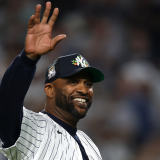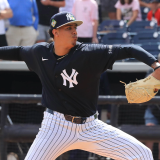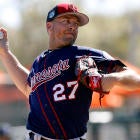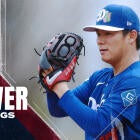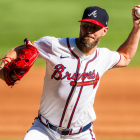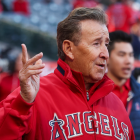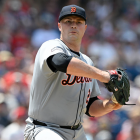
Why the Twins' Brandon Kintzler is baseball's most unlikely closer
Kintzler never appeared likely to reach the majors, let alone become a closer

Few baseball jobs are more prestigious than that of the closer. It's the closer who gets bigger contracts than his partners in relief; it's the closer who gets to celebrate a victory's final out; it's the closer who gets to pile up saves, baseball's best-branded statistic; and it's the closer who gets the cool beans audio-visual package when he enters a home game. The closer concept is outdated (and was never a great idea to begin with), but the label will engender respect for as long as it exists.
With so much riding on the ninth-inning assignment, it's no wonder some pitchers feel misplaced when they're tabbed as closer. Consider Brandon Kintzler, who, despite his 1.80 ERA and 11 saves (in 12 tries), is baseball's most unlikely savior due to his unorthodox background and profile.
The easiest way to sum up Kintzler's history is to be upfront about it. He's a two-time 40th-round pick who was released by the San Diego Padres a season and a half into his career due to a bum shoulder. He pitched for multiple independent league teams, though not always well, and landed with another major-league organization only after an impressive outing in the American Association's All-Star Game. The kicker? Kintzler appeared in that game against his agent's advice -- not because of the injury risk, but because it meant canceling a contract to play Tim Hudson in the "Moneyball" movie. Really:
"Forget the all-star game, Brandon," Kohler remembers telling him. "Come on. You're 5-foot-10 pitching indy ball. Go do your movie. You never know. You might meet somebody."
Kintzler never wavered. He wasn't ready to give up his dream.
"No, Kevin," he said. "I'm throwing good. I'm getting signed out of this all-star game."
Kintzler faced six batters, struck out five and signed a minor-league deal with the Milwaukee Brewers the next day.
Kintzler made it to the majors a little more than a year later, and looked the part of a quality middle reliever during the 2013-14 seasons. Alas, injury struck again, and Kintzler was again left unemployed. As with before, he overcame the odds to make it back to the majors. Moreover, he made it back to the majors and claimed the Minnesota Twins' closing job within a season. By fate or good fortune, Kintzler was with one of the few teams that would trust him in the ninth inning.
Most teams would've looked the other way because -- and yes, the Twins jokes write themselves -- Kintzler has one of the lowest strikeouts per nine innings rates among closers. In fact, he has the lowest K rate among pitchers with more than 20 saves since the beginning of last season. His lead is a fair one, too -- 5.69 versus Jeremy Jeffress' 6.00. Filter the requirements to include, say, current closing responsibilities, and Kintzler boasts an absurd lead over second-place Tony Watson (7.42).
It would be an overstatement to write that all Kintzler does is throw his mid-90s sinker and let batters beat it into the ground. But, well, that's mostly all he does. He has thrown more than 80 percent fastballs in 2017, and he has generated ground balls on 59 percent of those put into play, per Brooks Baseball. Occasionally, he catches batters off guard by mixing in a breaking ball. Otherwise, Kintzler is among baseball's most predictable pitchers -- and yet, somehow, it works.
Still, in an era where seemingly every pitcher tallies and every team values strikeouts, how is it possible that Kintzler is a contending team's closer? His ascent is largely due to a lack of alternatives. The Twins' established closer, Glen Perkins, and heir apparent, Trevor May, are on the shelf; Matt Belisle and Ryan Pressly have an average ERA over 7.00; Craig Breslow has an even worse strikeout rate than Kintzler; and Tyler Duffey is being used in a multi-inning role. That leaves Taylor Rogers, Adam Wilk and Justin Haley, and none of them have convincing cases to usurp Kintzler.
Somehow, then, Kintzler looks like the most qualified pitcher on his team to close out games. And somehow, that team is in first place. It's hard to tell which statement should cause more surprise.


